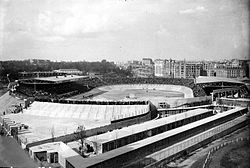| 1954 Rugby League World Cup final | |||||||||||||
|---|---|---|---|---|---|---|---|---|---|---|---|---|---|
| |||||||||||||
| |||||||||||||
| Date | 13 November 1954 | ||||||||||||
| Stadium | Parc des Princes | ||||||||||||
| Location | Paris, France | ||||||||||||
| Man of the Match | Don Robinson (Great Britain) | ||||||||||||
| Referee | Charles Appleton (Great Britain) | ||||||||||||
| Attendance | 30,368 | ||||||||||||
| Broadcast partners | |||||||||||||
| Broadcasters |
| ||||||||||||
| Commentators | |||||||||||||
The 1954 Rugby League World Cup final was the conclusive game of the 1954 Rugby League World Cup tournament and was played between France and Great Britain on 13 November 1954 at the Parc des Princes in Paris, France.
